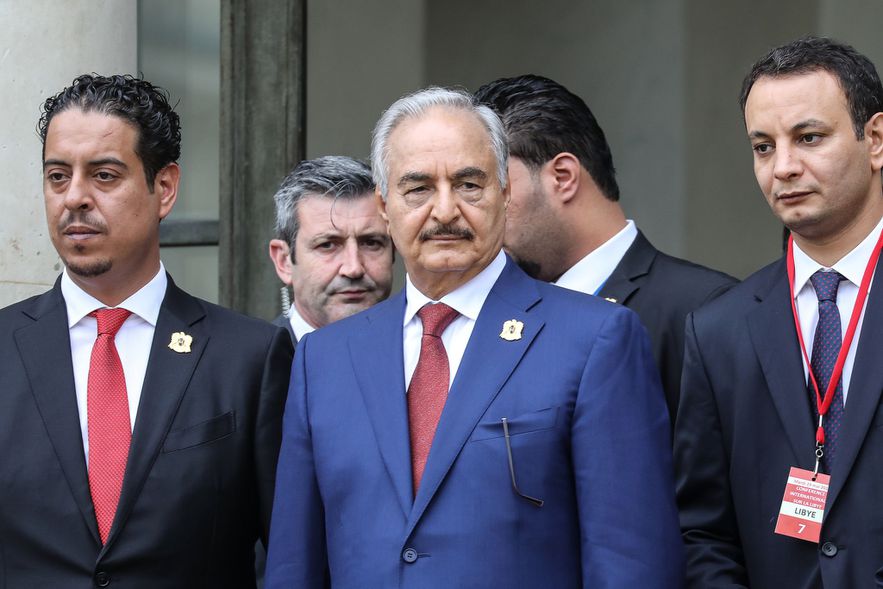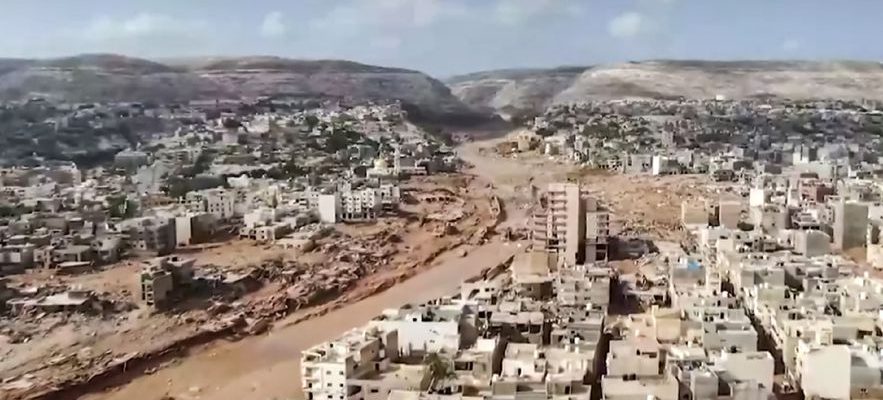Entire neighborhoods submerged by water and mud, landslides, enormous destruction. The Libyan coastal town of Derna offers an apocalyptic landscape after devastating floods. Provisional toll: more than 3,800 dead and thousands missing. A climatic catastrophe was therefore added, on September 10, to the other calamities endured by Libya. Storm Daniel buried this Mediterranean city in the east of the country – the territorial half where Marshal Haftar reigns. Dark irony of history: formerly occupied by the jihadists of the Islamist State (IS), Derna believed itself to be peaceful since it was liberated by the troops of Haftar and his Russian allies in 2018.
Capture of images broadcast on social networks by the Libyan television channel al-Masar, September 13, 2023, showing an aerial view of the damage caused by flooding in Derna, eastern Libya
© / afp.com/-
On Wednesday September 13, a French military plane carrying around forty rescuers and several tons of health equipment, including a field hospital, arrived in Libya to help those affected by the floods. The contrast is striking with Morocco, where King Mohammed IV refused French aid after the September 8 earthquake. “The image of France is not bad in Libya; it is a difference with many Sahelian countries, explains to L’Express Elseddiq Haftar, the eldest son of Marshal Haftar, who was in Paris when Storm Daniel hit his country. In 2011, he continues, the French government acted well by overthrowing, with others, the Gaddafi regime. But it is true that subsequently, nothing was undertaken to stabilize the country and lay the basis for an administration and a solid state,” Haftar’s son also explained last Sunday before interrupting a tour in Paris , Brussels and the European Parliament to reach Benghazi (east of the country) where one of the two chambers of Parliament is located – the other is in Tripoli (west of the country).
But where exactly is this oil country of 7 million inhabitants, prey to profound instability since the overthrow of Gaddafi? For about a decade, Libya has operated as a duopoly. In Cyrenaica (east of the country; capital: Benghazi), most of the oil wealth is under the control of Marshal Khalifa Haftar, who does not have the right to export it. And, in Tripolitania (West, capital: Tripoli), the government of Abdel Hamid Dbeibah, which has no oil but controls the oil export terminals. In short, the two leaders are holding each other by the goatee.
One, Dbeibah, in Tripoli, has the advantage of representing the government recognized by the international community. But the other, Haftar, in Benghazi, can count on a plethora of international support: Russia, United Arab Emirates, Saudi Arabia, Egypt, France, United States. Faced with this, Tripoli has the support of Turkey and Qatar.

Marshal Khalifa Haftar in Paris on May 29, 2018
© / afp.com/ludovic MARIN
Tired of more than a decade of conflict, everyone seems to want more stability and to move on. “Since the failure of his military offensive on Tripoli in 2019, Marshal Haftar has lost international prestige and credit with his supporters; we have moved to a phase of calm,” notes expert David Rigoulet-Roze. Haftar’s setback also explains the recent promotion of his elder Elseddiq Haftar, who is not a soldier like his brothers but a businessman with a degree in economics, which makes him presentable in the eyes of the international community. . Another factor of appeasement in Libya: the conflict in Ukraine, which monopolizes the Russians and many other actors, which indirectly contributes to “deconfliction”.
Putin’s mercenaries keep a low profile
The Wagner group? He was committed up to his neck to Marshal Haftar. The late Yevgeny Prigojine even visited him last October to demand 200 million dollars in cash in compensation for services rendered. Today, Putin’s mercenaries are remaining discreet. When asked about them, Elseddiq Haftar, who should have an idea on the subject, cautiously dodges: “You know, I am above all a member of civil society; I am not very versed in business military; I am not a politician either, rather a simple citizen of my country”, says the man who presents himself as a diplomat and an entrepreneur.
The only real good news: a certain stability is emerging on the economic field. “The two banks – one in the west, one in the east – have recently merged into a single central bank,” welcomes Haftar’s son. And this under the aegis of a consensual president at the head of the financial institution. The same phenomenon is observed at the head of the National Oil Corporation (NOC), the national oil company, where the team composed of the president of the company and his right-hand man is accepted, year after year, by all the parts. “It must be said that Libyan oil represents a real windfall and that everyone has an interest in finding common ground,” continues David Rigoulet-Roze, editor-in-chief of the magazine. Strategic directions. Down for a time to 400,000 barrels per day, black gold production rose to 1.2 million barrels [NDLR : elle était de 1,8 million de barils avant la chute de Kadhafi]. However, Libyan oil is, like Saudi oil, extremely inexpensive to extract: the extraction cost is around 1 dollar per barrel.
No national reconciliation possible immediately
Politically, rivalries remain keen and blockages numerous. In the west, for example, the presence – even the omnipresence – of Turkey is exasperating. The government of Abdel Hamid Dbeibah, in Tripoli, has in fact granted it the operation of the main air base as well as the two most important ports including that of al-Khoms which is the subject of a long lease of 99 years old. This flower made in Ankara sparked protests among the population, particularly in the port city of al-Khoms, but also beyond.
“The Turks feel more and more at home in Tripolitania, which upsets the national feeling of the Libyans, who are hardly enchanted by such control by Ankara.” Against the evidence of the facts (satellite photos prove that construction is underway), the Tripoli government denies wanting to rent the port of al-Khoms to Turkey. Obviously, no national reconciliation will be possible as long as the Turks occupy this port, said, in diplomatic terms and in an interrogative form, Elseddiq Haftar: “Tell me, in your opinion, the port of al-Khoms is in Libya or in Turkey ?”
“We must find the solution between Libyans”
With these tensions between the east and west of the country, the prospect of putting an end to the Tripoli-Benghazi duopoly remains remote. After the canceled ballots in 2021 and 2022, the presidential election was postponed sine die. Some hoped for an election in 2023. Unthinkable! And there is no indication that a vote will take place in 2024.
“Libyans must find the solution among Libyans, without foreigners getting involved, except in the role of simple observers,” believes Elseddiq Haftar, who could one day run as a candidate to replace his father. In 2021 and 2022, the organization of the ballot failed with the candidacies of Saïf el-Islam (the son of Muammar Gaddafi) and Marshal Haftar. Both had been challenged by their opponents. Lucid, David Rigoulet-Roze summarizes: “Alas, no one has yet found the holy grail that would allow us to emerge from the years of civil war.” For Libya, despite the oil windfall, the crossing of the desert is not over.
